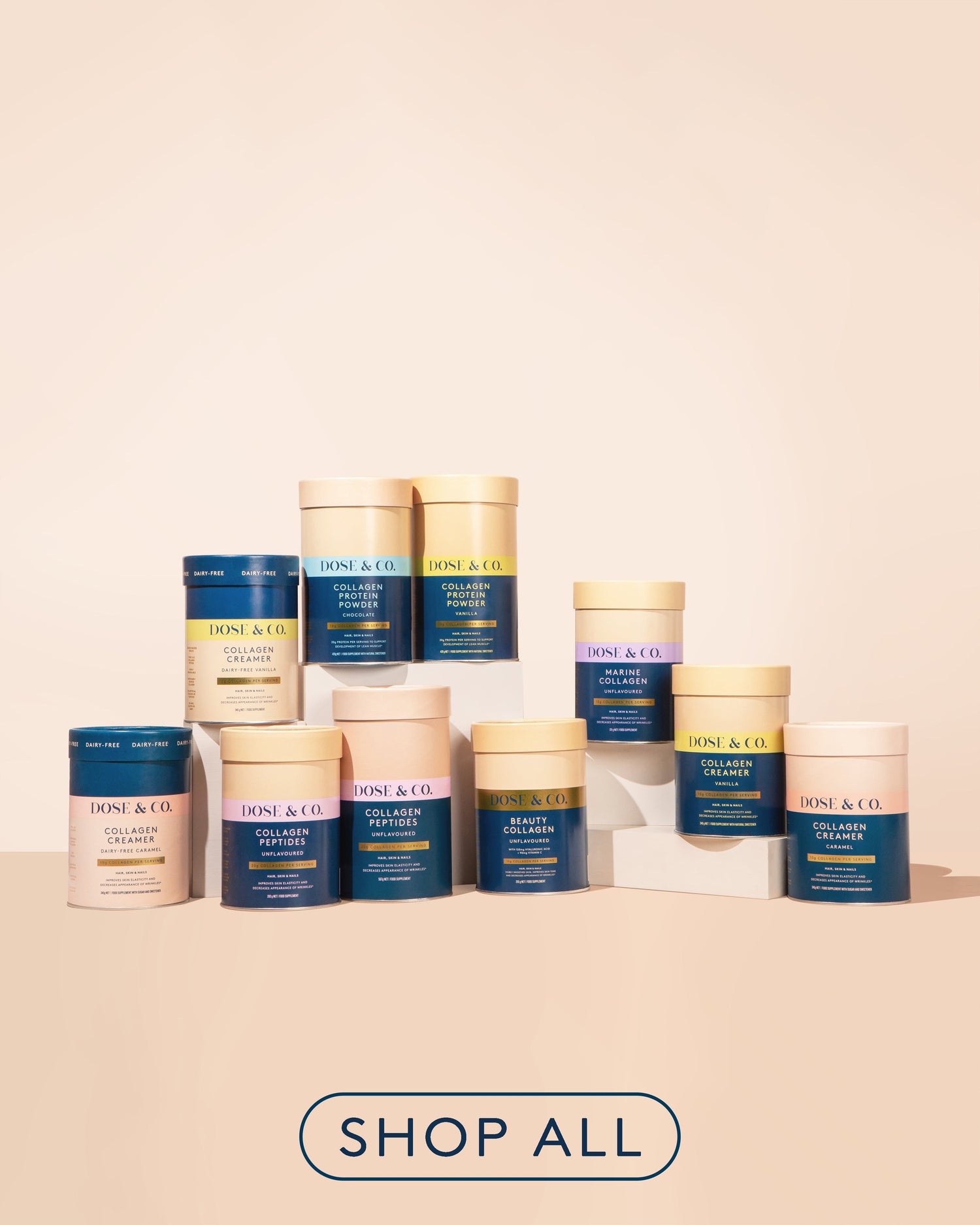Collagen is an essential protein that supports skin, hair, nails, tendons, ligaments and cartilage. It keeps our skin looking plump and elastic, and plays an important role in wound healing. A diet rich in collagen-boosting foods can help keep our skin looking its best. Dose & Co collagen peptides are sustainably sourced, high-dose collagen supplements which can help you to boost your collagen, it easily mixes in your favourite drinks.
WHAT IS COLLAGEN PROTEIN?
Collagen is the most abundant structural protein in the body, found in the framework of your cells and tissues. It’s also the main component of the body’s connective tissue, helping to make up your skin, hair, nails, joints, bones, cartilage, tendons and ligaments. In fact, it’s the main component of fascia, cartilage, ligaments, tendons, bone and skin. While collagen is mostly found in connective tissue (cartilage, bones, tendons, ligaments, and skin) it’s also found in your corneas, blood vessels, gut, intervertebral discs, and in teeth.
Collagen consists of three amino acids which bind together to form an elongated triple helix known as a collagen helix. Amino acids are molecules that combine to form various types of proteins. As such, amino acids and proteins are considered to be the building blocks of human, animal and plant life. The human body uses amino acids to make proteins which help the body grow, repair, break down food, and as a source of energy.
BENEFITS OF COLLAGEN
Collagen has many diverse functions in the body, and there are 28 types of collagen that have been identified in humans, which serve various purposes. The five most common types of collagen in the body are types I, II, III, IV and V. Healthy collagen levels contribute to skin health and elasticity, joint health, cardiovascular system health, and the protection of vital organs such as the kidneys.
COLLAGEN SUPPORTS SKIN, HAIR AND NAIL HEALTH
Collagen is also one of the things that gives skin its plumpness, hair its density, and nails their strength. Collagen benefits for skin are not only limited to It plays a particularly important role for the skin: not only does it provide the support matrix that underpins healthy skin, but our collagen levels are a key determinant to the preservation of skin firmness and elasticity as we age. Collagen—along with elastin and soft keratin—is largely responsible for skin’s strength and elasticity, and its degradation leads to the fine lines wrinkles that accompany aging.
WHY TAKE COLLAGEN SUPPLEMENTS?
The body produces and turns over its own collagen supply naturally—the term collagen comes from the Greek word, kólla, which means ‘glue’, and gennao, which means ‘I produce’—and does so quite well when we are young. This, however, starts to slow down with age. Collagen loss in the body starts anywhere from 18–29 years of age, and the body’s ability to replenish its own collagen starts to decrease by about 1% every year.
HOW TO RESTORE COLLAGEN IN THE FACE & BODY?
Along with being made naturally in the body, collagen can be derived from animal sources. It can also be consumed in the form of supplements: ingestible collagen powders and tablets (such as Dose & Co.’s collagen peptides ) that aim to increase both levels of, and production of, collagen in the body. Collagen peptides are high-dose collagen supplements which have scientifically shown improvement in skin elasticity , hair growth and stronger nails. This type of collagen—natural collagen from an external source that the body consumes and synthesizes—is referred to as endogenous collagen.
Endogenous collagen is most often sourced from bovine (animal) and marine (fish) sources. There are no true ‘vegan’ sources of collagen, as plants do not have naturally occurring collagen like humans and animals do. Collagen in different forms also has several medical functions, and is sometimes used in bone grafts, reconstructive surgeries, for wound healing, and in cosmetic procedures such as dermal (skin) fillers.

